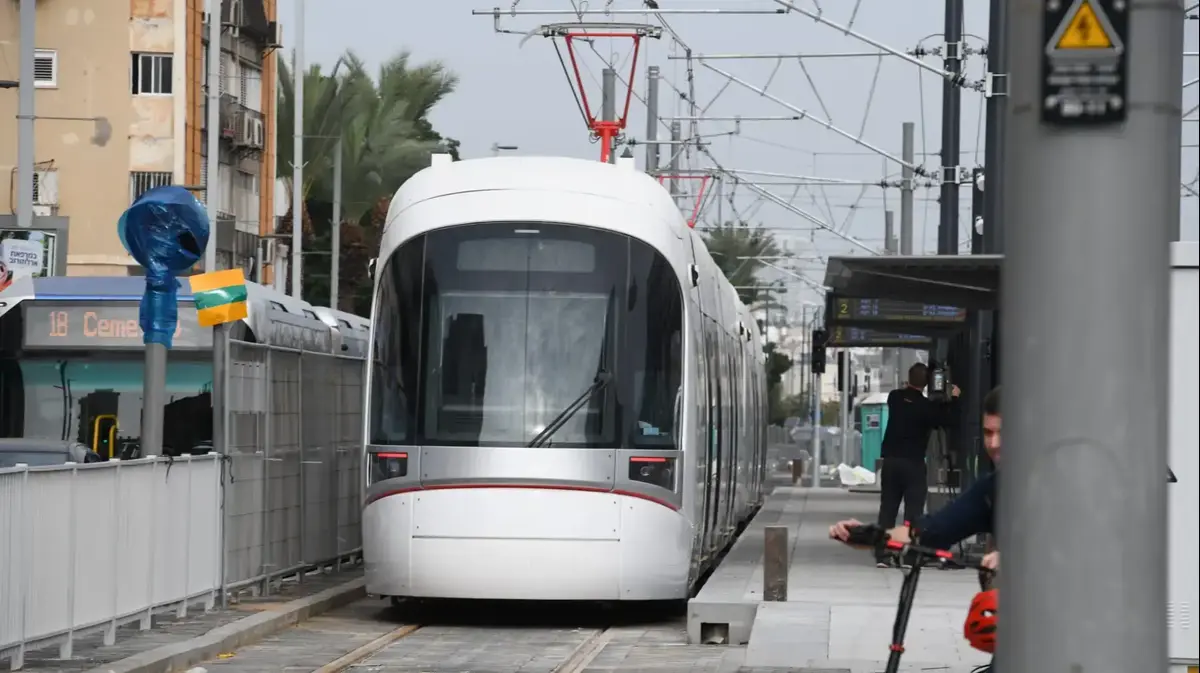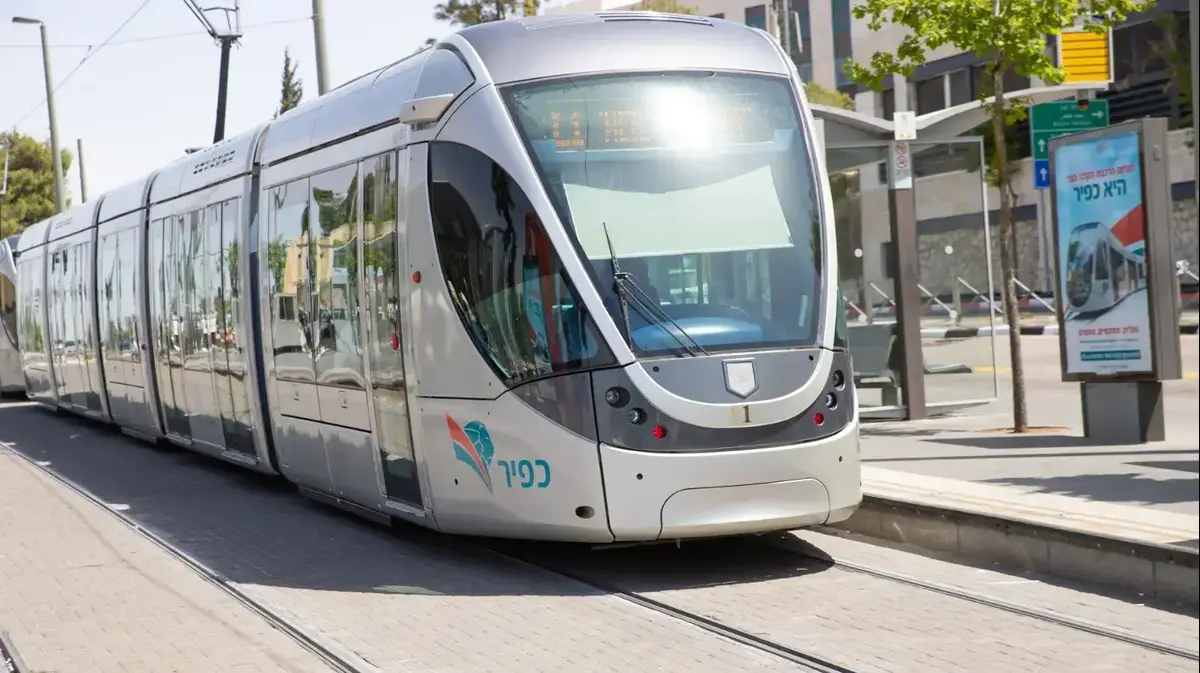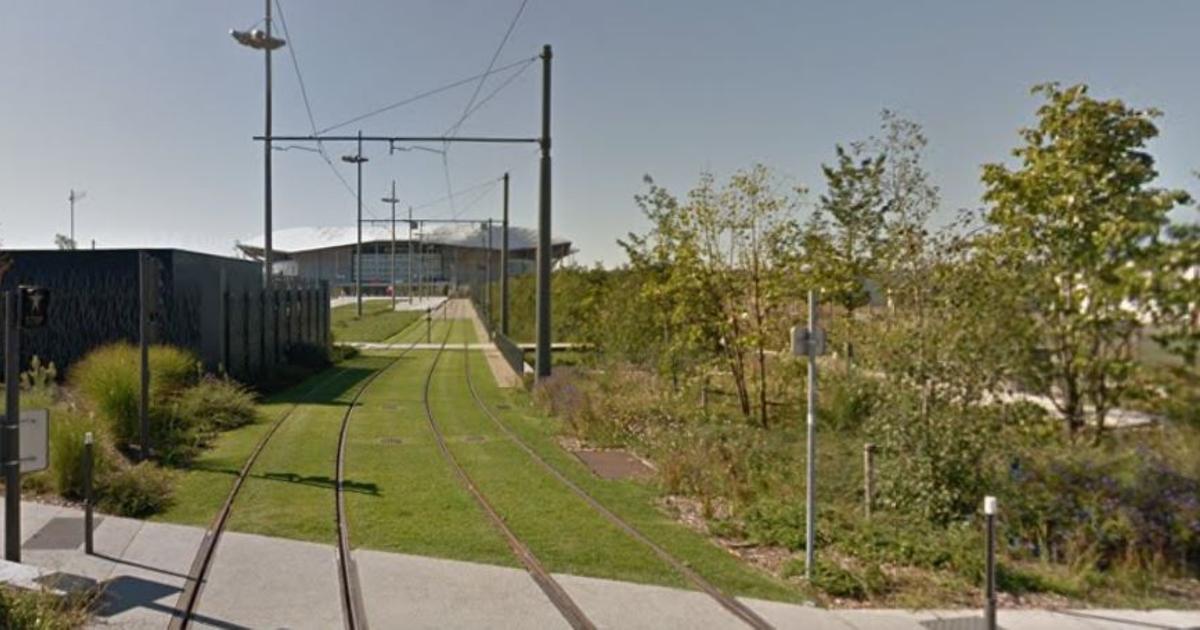news
News in Israel
Events in Israel
Doors open, worn brakes and derailment: Chinese company competing for light rail tender
The CRCC - which appears on the "blacklist" of the Americans - has a long history of submitting low-cost bids for tenders, as part of China's policy of taking over the rail market.
As a result, the cheap price has a high price in the long run.
Now, she is competing to carry out the ambitious transportation project in Israel
Tags
a train
China
United States
Keenan Cohen
Thursday, 02 December 2021, 13:52
Share on Facebook
Share on WhatsApp
Share on general
Share on general
Share on Twitter
Share on Email
0 comments
In the video: A test ride of the light rail on the Tel Aviv-Bat Yam line (still photography: Reuven Castro, video photography: Yotam Ronen)
One of the bidders in the tender to carry out the most ambitious transportation project in Israel in the coming years - the light rail in Gush Dan - is a Chinese company called CRCC. However, the company carries with it a series of suspicions around the world of bribery, forgery, life-threatening malfunctions and non-compliance with schedules. CRCC has a long history of bidding for "victory at any cost" as part of a policy of the Chinese government, the company's main shareholder, to expand its influence in various markets worldwide and to take over the global rail market in particular.
So what is behind the cheap bid submitted by the controversial company in the light rail tender in Gush Dan, by a gap of about a billion shekels less than those of the competitors? And what is expected to be the price that the Israeli public will pay following this "discount"?
The results of the tender for the operation of the green and purple line of the light rail were expected to be published in the coming days, and there is a fear that the public in Israel may pay the price of human life, in time and money, in exchange for this discount.
More on Walla!
The Economics Committee discusses the shutdown of the train: "Michaeli promotes Tahatz on Saturday, what about jobs?"
To the full article
More on Walla!
The light rail is on its way: join the test ride between Tel Aviv and Bat Yam on the red line
Including light rail: Tel Aviv's new public transportation maps
The swimming method that will change your life (and make you fit)
CRCC: Chinese Government Railway Patrol
CRCC appears on the "blacklist" of the US administration, that is, companies that the state defines as problematic and imposes sanctions on contracting with them. The World Bank also imposed sanctions on it in 2019 following activities defined as fraud. The CRCC has a long history of bidding in the concept of "win at any cost", which is known in professional parlance as dumping (a significantly lower bid as a way to ensure a win) as part of the Chinese government's major shareholder policy to expand its influence in the markets. Various in the world in general and taking over the global railway market in particular. This is another tier of the concept of Chinese expansion that seeks to produce a strategic continuum of control over seaports and transport channels from Eastern to Europe. Among other things, by competing and winning tenders for the construction and operation of seaports, similar to the new port in Haifa. As part of this policy, there is a suspicion that CRCC is approaching tenders around the world at a loss, only to run over competitors and win.
In June of this year, the U.S. administration issued an extension order to the Trump administration (blacklist of Chinese companies threatening U.S. national security - a list released during 2018), which included CRCC in a list of companies the United States bans U.S. citizens from investing in because of ties Their involvement in the Chinese military, their involvement in the development of the military industry and the advancement of China's intelligence capabilities.
CRCC admitted that without government assistance, it would not be able to compete.
Travel on the red line in Gush Dan (Photo: Reuven Castro)
Underground takeover
The light rail project is one of the largest and most ambitious in Israel since time immemorial. It has a decisive impact on the lives of millions of Israelis during the works and of course on their quality of life after its completion. The results of the auction and the identity of the winners have fateful consequences for decades to come. As a result, the need and public necessity arises to find out how the company - which plays a large part in its establishment - is conducting other international projects, ranging from fraud and alleged breaches of trust, through life-threatening incidents and defects and even to possible state security breaches.
The light rail in Gush Dan is intended to be the main means of public transportation of the entire Gush Dan, the center and beating heart of the State of Israel.
This is one of the most complex, expensive and significant projects in the country's history and its total cost is estimated at NIS 40 billion or more.
The railway project will include three lines, which will connect the cities of the center and is expected to serve about 180 million passengers a year.
The management of the process was entrusted to Nata, which conducts the various tenders for the planning and execution of the works on the three lines. These tenders and the companies that will win them will have profound effects on the lives of Israelis for years to come: at the economic, transport and political level.
Will they win the tender?
Works on the light rail in Petah Tikva, June (Photo: Reuven Castro)
The red line is in advanced stages of construction and is expected to be completed at the end of 2022. The green and purple lines have a single tender, which closes for bids in September 2020. It will include (on both lines together) a 68 km line that will pass through eight cities (Holon, Rishon Lezion, Tel Aviv, Givatayim, Ramat Gan, Herzliya, Kiryat Ono and Judah) and 105 stations, providing service to approximately 110 million passengers per year. the estimated cost of the tender is 15 billion. the tender results should be published soon.
list of groups participated in the tender include the Spanish CAF in collaboration with benign; Chinese CRCC with Housing and Construction and Egged; Elstom in partnership with Electra and Dan; Chinese CREC in partnership with Canadian Bombardier, Excellence, Keren Noy and Phoenix, and the fifth group is China Harbor, in partnership with Minrav, Allied and Clal.
Travel on the Red Line (Photo: Reuven Castro)
However, the proposal submitted by CRCC with Shikun VeBinui and Egged was found to be significantly lower than the proposals of the other entities, which led NTA to open an investigation into the meaning of the low offer in August. anyway - if the bill is approved, will turn to offer other court to Lift screen "and clarification of details and an injunction to publish the winner, if disqualified for proposal will direct the partnership and will seek an injunction.
The practical implication is an injunction and / or litigation Bat months Will further delay the process that is supposed to take about a year of financial organization in any case, a delay that will be added to the many problems the project is already suffering from, including the evacuation of an entire village in Tel Aviv.
The concern behind winning a company whose bid is too low is that later on the bidder will have difficulty meeting the tasks and scope of execution as well as the degree of bank guarantee given to the winning company.
In the case of this partnership by Bank Leumi.
And these concerns have a basis, whether in the first round of preparatory work for its pre-nationalization light rail, when businessman Lev Leviev's financial offer was rejected by funding sources and also with the current Chinese company CRGT, which carries out the red line. During the implementation, demands arose to increase the budget.
Suspicions of corruption: fraud, conflicts of interest and forgeries
CRCC is facing suspicions of alleged corruption in major projects around the world. For example, in 2014, the company headed by a concern owned by it approached a tender to build a high-speed train in Mexico. Mexico budgeted for the tender six months and at the end CRCC won. It is important to note that the CRCC did not have any competitors at the end of the auction. 16 companies, including Bombardier, Mitsubishi and Siemens were interested in the tender but asked to extend it so they could submit bids, the request was rejected by the government, which helped CRCC win.
After the victory in the tender, some problematic facts were revealed: First, the wife of the President of Mexico purchased from a Mexican subsidiary of CRCC called GRUPO HIGA a property whose real value was about seven million dollars at a strange price of only $ 1 million. At no stage were official explanations given as to how the president's wife purchased an apartment directly from a body with an interest in a government tender. This conflict of interest created a significant media storm and led to the cancellation of the tender and the opening of a new tender.
A senior European company interested in the original tender said the source of the company's funding was what made the original tender uncompetitive, a recurring pattern of action: The Chinese government has promised to fund 85% of the project cost through EXIM BANK. According to the same European official, Chinese funding is what allowed the CRCC to make a particularly attractive offer that included not only the trains themselves, but also the tracks, stations and other infrastructure. He said his company had no shadow of a chance to offer such funding and therefore could not compete. Currently, the project is completely stuck and no work is expected to start, although the train was supposed to start operating as early as June 2021.
Another example of alleged corruption occurred in 2016 in Australia, when the company won a state tender to build a $ 2.3 billion train fleet in Melbourne.
According to local reports, the project, which was delayed by about 18 months, was earlier on suspicion of breaches of trust - the senior official was appointed to promote the project on behalf of the local government in Melbourne.
He is a former employee of a company related to Downer, and about eight months after the project was approved, he was re-employed by the corporation.
The company offers quotes at non-competitive prices, which other companies cannot match (Photo: official website, NTA)
The media in Bangladesh reported in 2020 that two subsidiaries of CRCC - CRCC Harbor and CCECC, had set up a joint venture, in which they competed for a tender to extend the runway and landing at the country airport and even won it. In this case, it was discovered that the companies submitted documents in which the information contained in them (execution capabilities, costs and meeting deadlines) was misleading and the experience certificates were forged. Following the discovery the auction reopened. This is not the first time the company has won a tender in Bangladesh, and then the tender was reopened due to suspicion of counterfeiting: in 2011 CRCC submitted a bid for a tender to build a bridge in Bangladesh. It was forced to cancel its bid for a $ 2.9 billion project. The reason was, as in other cases, significant discrepancies and irregularities in the information that the company presented as part of its quote. Even after re-examining the documents and receiving new documents, the company simply failed to dispel the Tenders Committee 'concern that there would be irregularities and an inability to verify the company's claims.
In 2019, the World Bank imposed sanctions on the company and its subsidiaries, following activities defined as fraud.
All this is due to the decision of the responsible committee, which came to the conclusion that CRCC has engaged in fraudulent activities in Georgia through its subsidiaries.
According to the publication, the companies presented information in the bidding phase (tender bids) of the tender, which included a false impression regarding the manpower and equipment of China Railway 23 and regarding the experience of other entities under CRCC in performing works of the required type.
If that wasn’t enough, in South Africa it was reported during the year that the state court froze 4.2 billion rand ($ 297 million) linked to the CRRC company.
The Chinese company's deals with the state-owned logistics group, Transcent, were investigated on suspicion that the company bribed public officials.
The Special Investigations Unit in South Africa said the suspicion was that the funds were "income from illegal activities between 2011-2014".
Travel on the Red Line (Photo: Reuven Castro)
Loss tenders and life-threatening incidents
According to evidence given in the U.S. Senate debate, there is ample evidence that the Chinese Communist Party is using companies like CRRC and CRCC to achieve its goals as part of Made In China 2025. As part of this plan, the Chinese government has defined the global rail industry as a takeover target. To ensure this, the Chinese government provides the said companies with subsidies and financing on special terms in order to enable them to submit market-breaking bids for each tender to which they approach. These companies have no choice but to follow this policy, as the company's procedures explicitly state that the company must receive instructions from the Chinese government regarding its activities.
As a result of Chinese policy, the CRRC has a goal of taking over the global caravan market, as can be seen in the company's tweet that explicitly states this. Since 2014, the company has won four different tenders in the United States - in Boston, Philadelphia, Chicago and Los Angeles. In each case, they have seized it, despite obstacles we can scarcely imagine. "
In 2019 it was reported in the American media that the CRRC company had submitted a tender for the supply of 284 railroad cars for two lines in Boston.
The company submitted a bid of $ 566 million, a bid significantly lower than that of the competing companies, with the closest competitor being the Korean Hyundai offering a bid of $ 720 million - a difference of about $ 154 million.
Two other companies that competed were the Japanese Kawasaki with a bid of 905 million, and Bombardier with 1.08 billion, meaning a difference of about $ 340 million and $ 450 million from the more expensive competitors.
This is a deliberate low pricing policy, which does not allow for fair competition.
It is important to note in these contexts that the companies that competed with the Chinese proposals, Hyundai, Mitsubishi and Kawasaki are recognized in Israel mainly as vehicle manufacturers, but this is only one significant arm of activity (in the case of Hyundai) or secondary (in the case of Mitsubishi and Kawasaki) within a huge industrial concern.
Doors open, worn brakes and derailment
The cheap price in the short term has a high price in the long term - in the carriages purchased from CRRC, a variety of faults related to quality and safety were discovered. In September 2019, doors in several carriages were opened in the middle of the journey and it turned out that parts of the door did not meet the required load, which led to the fact that not only the doors in the specific carriages had to be replaced, but in each and every active caravan. In addition, two months later a six-car CRRC train derailed while traveling. Luckily there were no train passengers at the time of the accident, but there was serious damage to the track worth $ 102 million.
A month later, the carriages were taken out of operation due to unusual noises coming from the bottom of the carriages. The source of the noise was discovered in the friction-absorbing pads that wore out in a shorter time than expected and had to be replaced out of concern that leaving them would cause an accident or damage. In March 2020 - just a few months later - it turned out that there was another glitch, this time in the axles that are part of the rim, the part that allows trains to make turns.
The company won another tender in the United States, this time in Chicago in 2016.
The tender was held in two rounds: the first was canceled due to a minority of participants (only two companies approached).
Also in the second round there were only two participants, one is CRCC, and the other is Bombardier, which also applied in the first round.
The Chinese company has released a document aimed at showing how their offer was competitive and fair.
However, this document is misleading, as it presents as a point of comparison the cost per caravan instead of the total cost.
When the tender is presented as such, the difference seems less significant, $ 1.55 million per car on behalf of CRCC compared to 1.82 on behalf of Bombardier.
But this difference, when all the cars in the tender are summed up, over 800 cars, comes to a difference of $ 226 million, a significant difference of course.
According to sources in the Rail Safety Alliance, this price stems from Chinese government support that subsidizes the activities of the CRCC, which in fact does not have to play by market rules.
A derailed train in Washington (Photo: Reuters)
Australia has a policy of free trade and weak local currency, facts that have allowed the CRCC to enter the Australian rail market on particularly favorable terms and take over it altogether, with the help of backing and funding from the Chinese government. As reported on CNBC in 2017, within ten years all local competitors stopped producing or closed down completely, to the point that the Chinese company controls the entire market without competition. This is also the risk to the US market.
It can be learned from these testimonies that the entry of such companies into the domestic market has a devastating effect on local competition to the point of total external takeover. It can be assumed that a similar thing will happen in Israel, if these companies are allowed to enter operations in the country, especially if the Chinese companies acquire and operate with the help of a local company, as it seems that the pattern of action leading to local occupation begins with entry into the market.
It can be said that the Australian experience and the various testimonies from the United States, show a clear intention to take over foreign markets through dumping.
In this case, bidding at low to non-competitive prices that other companies can not match.
CRCC admitted that without government assistance, it would not be able to compete, after the company received $ 194 million in government assistance in 2014, and $ 269 million a year later.
There is no reason to estimate that this government funding will stop or decrease, on the contrary, it is likely to increase.
It will end in court
In terms of the Israeli-Chinese partnership that includes CRCC, Shikun VeBinui and Egged, the arrival at the hearing was made with full confidence in receiving the opinion it was asked to present and their arrival is strong and grounded in the procedure.
At least that's what people involved in the partnership are telling us.
However, the decision of the sources in NATA is really not the end of the verse.
Factors in housing and construction.
"We do not see a scenario of disqualification, but if so, certainly in the case of a billion-dollar project, we will exercise our rights under the law of tenders in the State of Israel."
Share on Facebook
Share on WhatsApp
Share on general
Share on general
Share on Twitter
Share on Email
0 comments















